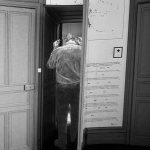Common senses: Deleuze and Lyotard between ground and form
Common senses Deleuze and Lyotard between ground and form Frédéric fruteau de laclos ‘One day, perhaps, this century will be known as Deleuzian.’ This is how Michel Foucault famously opened his admiring review of Gilles Deleuze’s Difference and Repetition. [1] Responding to the praise, Deleuze merely called attention to the hint of humour underlying Foucault’s […]







